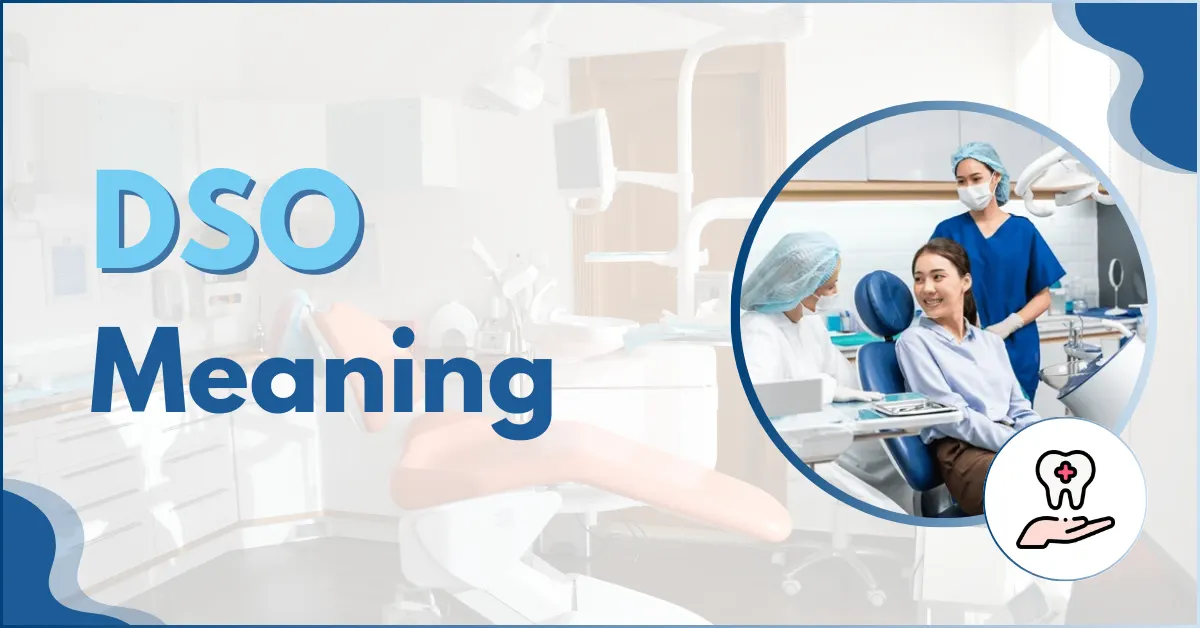If you’re a dentist running your own practice, you know how hard it is to balance patient care with all the business work, billing, HR, hiring staff, ordering supplies, and even IT problems.
This is where DSOs come in.So let’s talk about what DSO meaning is, how it works in dentistry, and whether it’s the right choice for your practice.
Understanding DSO Meaning in Dentistry
DSO stands for Dental Service Organization or Dental Support Organization. Simply put, it’s a company that helps dentists by handling all the non-clinical tasks in a dental practice. That means the dentist can focus only on treating patients while the DSO manages the rest.
DSO does not own the clinical part of the practice. Dentists are still in charge of diagnosis and treatment. Here is what a DSO typically helps with:
What is DSO? Main Types Explained

When it comes to running or selling a dental practice, one term that often pops up is DSO (Dental Service Organization). But did you know there are different types of DSOs out there?
1. Traditional Dental Service Organizations (DSOs)
How Traditional DSOs Work
Traditional DSOs are what most people think of when they hear the term “DSO.” These organizations own or manage multiple dental practices under one umbrella. Dentists typically sell their practice to a DSO and become an employee or contractor in the same clinic.
The DSO handles the business side of things, like HR, billing, marketing, equipment, and compliance, while the dentist focuses on treating patients.
Pros of Traditional DSOs
Cons of Traditional DSOs
2. Dental Partnership Organizations (DPOs)
How Dental Partnership Organizations Work
Dental Partnership Organizations blend ownership with support. Here, dentists remain partial owners of their clinic but enter a partnership with a larger DSO-style company.
The DPO helps with operations, while the dentist still has equity and influence in decisions.
Pros of Dental Partnership Organizations
Cons of Dental Partnership Organizations
3. Dental Partnership Groups (DPGs)
How Dental Partnership Groups Work
DPGs are usually formed by dentists themselves, a small network or alliance of independent dentists who join forces.
They pool resources and share certain business functions like marketing or staff training, but each practice stays independently owned.
Think of it like a co-op model, where everyone contributes and benefits.
Pros of Dental Partnership Groups
Cons of Dental Partnership Groups
Here is a quick comparison:
| Type | Ownership | Business Support | Clinical Freedom | Ideal For |
| Traditional DSO | No | Full | Low | Dentists wanting to focus purely on patient care |
| DPO | Partial | Full | Medium | Dentists who want support + some control |
| DPG | Yes | Shared/Minimal | High | Independent dentists seeking growth without selling |
How Does Billing Work with a DSO?
Billing is one of the biggest headaches in any dental practice. When you join a DSO, they usually take over your billing system. Their expert billing team will:
This can be a big relief, especially if your in-house billing is slow or you’re losing money due to errors. In fact, DSO dental insurance billing is often more efficient because they have trained staff and modern systems.
What to Look for in a DSO
Not all DSOs are the same. Some give you a lot of freedom, while others take more control. Before joining one, ask yourself:
Before signing on, check:
Pros and Cons of Selling Your Practice to a DSO
If you are thinking of selling your practice to a DSO, here are the good and bad sides.
Pros:
Cons:
Why More Dentists Are Selling to DSOs

In recent years, many dentists, especially younger ones, have joined DSOs. Why?
Do DSOs Still Need Dental Billing Help?
Yes! Even big DSOs struggle with billing sometimes. Dental insurance is complex and always changing.
Some DSOs:
It shows that billing is a significant aspect of running a successful dental business; it can’t be ignored, even by large DSOs.
10 Ways to Add Value by Outsourcing Dental Billing
Even if you are with a DSO or running your own clinic, you can benefit from professional billing help.
Here are 10 reasons why dentists outsource billing:
- Reduce Claim Denials: Experts stay updated on coding and submission rules.
- Increase Collections: Faster and more accurate processing means more money in your pocket.
- Free Up Staff Time: Your in-house team can focus on patient care and in-office tasks.
- Access Expertise: Benefit from specialists who deal with dental billing all day, every day.
- Improved Cash Flow: Consistent and efficient billing leads to predictable revenue.
- Reduced Overhead: No need to hire, train, or pay benefits for in-house billing staff.
- Compliance Assurance: Billing services ensure you’re always compliant with regulations.
- Better Patient Experience: Fewer billing headaches for patients means happier patients.
- Focus on Core Business: You get to do more dentistry.
- Scalability: Easily adapt billing support as your practice grows or changes.
Why Is DSO Important?
DSOs are becoming more popular because they help dentists in many ways:
But remember: Not all DSOs are perfect. You need to choose carefully and make sure it matches your goals.
Benefits of Partnering with a Dental Service Organization
What are Some Things to Consider Before Signing a Contract with DSO?
Before signing a contract with a DSO, here are some important things to consider:
- Clinical control: Will you still make your own treatment decisions?
- Length of the agreement: How long is the commitment?
- Exit terms: Can you leave easily if things don’t work out?
- Profit-sharing: How will income be divided?
- Support details: What exactly will the DSO handle (billing, HR, marketing)?
- Performance expectations: Will there be pressure to hit certain patient or revenue targets?
Best Dental DSO to Work For?
Here are some of the best DSO you can consider working with
These DSOs were named in Newsweek’s America’s Greatest Workplaces in Health Care based on employee feedback (beckersdental.com)
DSO Meaning in Other Contexts
You might have seen “DSO” used in other places, but those meanings are different:
But here, we are talking only about DSO dental meaning, helping dentists run their practice smoothly.
Wrapping Up
The DSO’s meaning in dentistry is simple: it’s a support system for dentists who want help running their clinic. You don’t have to say yes right away. But it’s a good idea to learn about it and think long-term. If you want less stress, more support, and better work-life balance, a DSO might be right for you.
If you like full control and are good at business, running your own private clinic could still be the best fit. Whatever you choose, just make sure the decision helps you grow, both as a dentist and as a business owner. Whether you’re part of a DSO or running a private clinic, getting more patients starts with visibility.
Learn how to grow your dental practice online with expert SEO designed specifically for dentists.
Ready to attract more patients and grow your practice alongside industry insights like DSOs?







